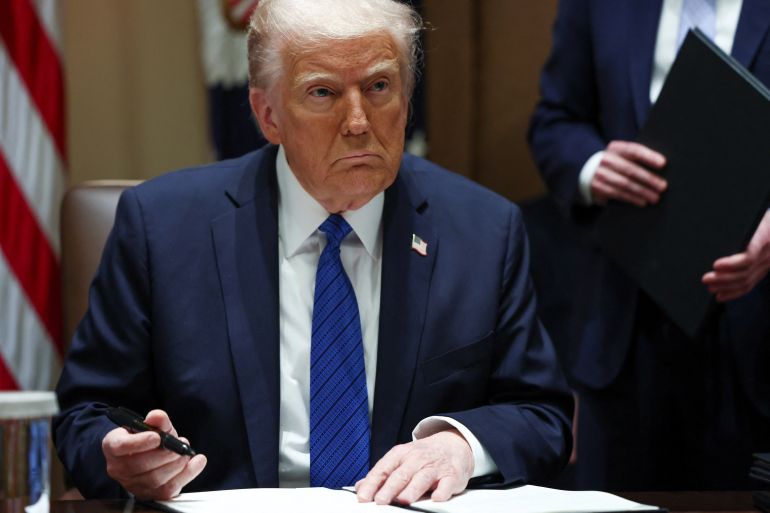Trump signs new executive order to change election rules: What we know
The order says voters must provide proof of US citizenship and only ballots received by Election Day will be counted.

By Al Jazeera StaffPublished On 26 Mar 202526 Mar 2025
United States President Donald Trump has signed a new executive order that he argues is aimed at tightening election rules ahead of the 2026 midterms, touching upon a claim he has frequently made – without evidence – of large-scale election fraud.
Titled “Preserving and Protecting the Integrity of American Elections,” the new order introduces strict new requirements that voters must meet in order to cast their ballot.
Recommended Stories
list of 1 itemend of list
Here is what we know:
Key aspects of the new executive order
Proof of Citizenship Requirement:
To prevent non-Americans from voting in a federal election – an act that is already illegal and punishable by prison time and deportation – the order requires voters to submit official proof of US citizenship, such as a US passport or a birth certificate.
Federal agencies, including the Department of Homeland Security, will be required to share data to help state officials identify non-citizens on voter rolls. However, voting rights groups have raised concerns that the citizenship requirements could lead to voter disenfranchisement.
Advertisement
“This would prevent only a tiny amount of noncitizen voter registration but stop millions of eligible voters, who do not have easy access to documents such as passports, from registering to vote,” Richard Hasen, an election law expert at the University of California, Los Angeles, said in a blog post.
There are also concerns that married women who have changed their last names may face difficulties registering to vote, as their birth certificates reflect their maiden names.
The advocacy group Public Citizen pointed out that roughly 146 million Americans do not have a passport.
Ballot submission deadline:
All mail ballots are required to be received by Election Day to be counted according to the executive order, aiming to standardise the voting process across states.
Across the country, states currently have wide latitude to administer elections differently – but none allow votes to be counted if they are cast after Election Day.
According to the National Conference of State Legislatures, a nonprofit organisation, 18 states, including battleground states, currently accept mail-in ballots that arrive after Election Day, provided they are postmarked on or before that day.
Advertisement
California, the most populous state in the country, is often cited for its prolonged vote-counting process – it allows ballots to be counted up to seven days after the election, as long as they were postmarked by Election Day.

Federal funding conditions:
States that do not comply with some of these new requirements risk losing federal election funding.
“The Attorney General shall take appropriate action against states that count ballots received after Election Day in Federal elections. Federal election funding will be conditioned on compliance,” the executive order says.
This could place significant financial pressure on states, especially those that currently allow more flexible voting procedures.
Electoral campaign financing happens at the federal, state and local levels, with funding coming from individuals, corporations, political action committees (PACs), and, in some cases, government.
In March 2024, the US Congress allocated $55m in new federal funding to states under the Help America Vote Act (HAVA) to enhance the administration and security of federal elections.
This funding was distributed among all US states and territories based on a predetermined formula, which considers factors such as the size of the voting-age population.
Data sharing and prosecution:
Trump’s order also instructs the Secretary of Homeland Security, Kristi Noem, to ensure that states have access to systems capable of verifying the citizenship or immigration status of individuals registering to vote.
Advertisement
It also directs the Department of Homeland Security, along with an official from the Elon Musk-led Department of Government Efficiency, to review state voter registration lists – and, if needed, use subpoenas – to ensure compliance with federal standards.
“DOGE certainly has no power to kick people off rolls. But they could make a lot of noise trying to claim they’ve found fraud when they find that voter registration rolls are not being kept up to date,” Richard Hasen wrote.
Will this new order face challenges?
Trump’s order is likely to face legal challenges, given that the Constitution gives authority over elections to the states.
Arizona Secretary of State Adrian Fontes said he and state Attorney General Kris Mayes are already in discussions about a possible lawsuit, describing the executive order as “an attempt to federalise elections”.
Fontes said that the order appears aimed at creating the illusion of misconduct in the electoral process, potentially to justify “cancelling the election later”.
“It’s very methodical, and very, very dangerous,” he said in an interview with Votebeat , a nonprofit, nonpartisan newsroom focused specifically on US elections, on Tuesday. “You have to pay attention not to what the executive order says, but what the end game may be. I believe the end game may be that Donald Trump wants to stay in office in perpetuity.”

Who is supporting this new order?
Conservative groups, including the Heritage Foundation, praised the order.
Advertisement
“President Trump is finally taking the action long needed to put the resources of federal agencies like the Departments of Homeland Security and Justice to work helping states, instead of trying to hinder their efforts to reform our election process, which was an unfortunate hallmark of the Biden administration,” Hans von Spakovsky, who leads the Heritage Foundation’s Election Law Reform Initiative wrote in a statement.
Trump has often questioned the outcomes of elections that have not gone his way, including his 2020 defeat to former US President Joe Biden, which he falsely attributed to widespread voting irregularities.
